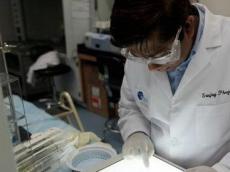|
|
TODAY.AZ / Weird / Interesting
AIDS-like disease revealed
25 August 2012 [15:47] - TODAY.AZ
 Even as the promise of an AIDS vaccine seems finally within humanity`s reach, researchers in the United States have discovered a new disease —as-yet unnamed, but fortunately non-contagious— with very AIDS-like symptoms.
Even as the promise of an AIDS vaccine seems finally within humanity`s reach, researchers in the United States have discovered a new disease —as-yet unnamed, but fortunately non-contagious— with very AIDS-like symptoms.AIDS —or acquired immune deficiency syndrome— results from the human immunodeficiency virus (HIV), which completely disables its host`s natural defenses against infection. In the Philippines alone, as of June 2012, there were 295 reported HIV-positive cases, 16 of which were AIDS cases, according to the National Epidemiology Center`s latest HIV Surveillance Report.
However, unlike HIV, the newly-discovered immunodeficiency disease does not spread through a virus, nor is it inherited, said Dr. Sarah Browne of the US National Institute of Allergy and Infectious Diseases.
HIV attacks and destroys T-cells, the main defense of the bodies against germs. In contrast, the new disease does not affect those cells but in stead causes "a different kind of damage," said Browne.
Her study of 206 people from Taiwan and Thailand found that most of those infected with the disease make substances called "autoantibodies" that attack the body`s own tissues instead of fighting off invading germs.
The autoantibodies found by Browne`s study block interferon-gamma, a chemical signal that helps the body fight off infections. When the chemical signal is blocked, the person becomes vulnerable to fungal infections, viruses, parasites, and other bacteria —just as in an AIDS patient.
/gmanetwork.com/
URL: http://www.today.az/news/interesting/111578.html
 Print version
Print version
Views: 2355
Connect with us. Get latest news and updates.
See Also
- 19 February 2025 [22:20]
Visa and Mastercard can return to Russia, but with restrictions - 05 February 2025 [19:41]
Japan plans to negotiate with Trump to increase LNG imports from United States - 23 January 2025 [23:20]
Dubai once again named cleanest city in the world - 06 December 2024 [22:20]
Are scented candles harmful to health? - 23 November 2024 [14:11]
Magnitude 4.5 earthquake hits Azerbaijan's Lachin - 20 November 2024 [23:30]
Launch vehicle with prototype of Starship made its sixth test flight - 27 October 2024 [09:00]
Fuel prices expected to rise in Sweden - 24 October 2024 [19:14]
Turkiye strikes terror targets in Iraq and Syria - 23 October 2024 [23:46]
Kazakhstan supplied almost entire volume of oil planned for 2024 to Germany in 9 months - 23 October 2024 [22:17]
Taiwan reported passage of Chinese Navy aircraft carrier near island
Most Popular
 Hornet's nest has been stirred up: how topic of Western Azerbaijan scared revanchists
Hornet's nest has been stirred up: how topic of Western Azerbaijan scared revanchists
 Huawei debuts new smartphones and devices in Argentina
Huawei debuts new smartphones and devices in Argentina
 Azerbaijan, Turkiye sign pact to strengthen military security
Azerbaijan, Turkiye sign pact to strengthen military security
 Russia open to consultations on TRIPP initiative with Armenia
Russia open to consultations on TRIPP initiative with Armenia
 Why Iran fears Corridor that Armenia sees as lifeline
Why Iran fears Corridor that Armenia sees as lifeline
 PM Asadov mulls regional co-op and North-South corridor with Astrakhan governor
PM Asadov mulls regional co-op and North-South corridor with Astrakhan governor
 President Ilham Aliyev addresses participants of 8th Congress of Azerbaijan Trade Unions Confederation
President Ilham Aliyev addresses participants of 8th Congress of Azerbaijan Trade Unions Confederation
